‘I’m not thinking about legacies’: Malinauskas marks one year of Labor Government
Ahead of the one-year anniversary of Labor’s March 2022 state election victory on Sunday, Premier Peter Malinauskas sat down with Stephanie Richards to discuss progress on promises to fix ramping, the politics of heritage protection, his views on jailing 10-year-olds and the challenges of a second year in office.
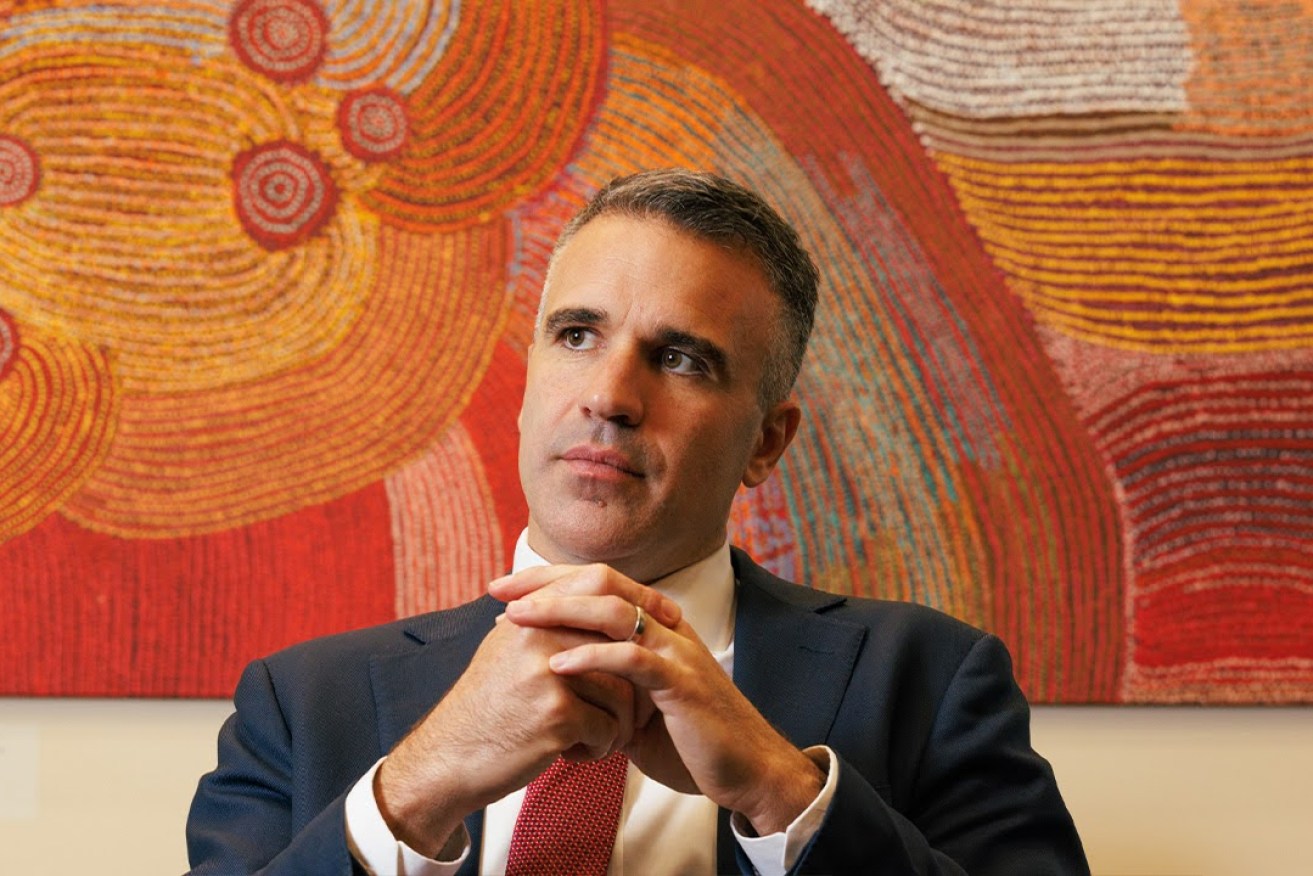
Premier Peter Malinauskas Photo: Tony Lewis/InDaily
On the evening of March 19, 2022, Premier-elect Peter Malinauskas strode onto an Adelaide Oval stage in front of a crowd of exuberant Labor volunteers, MPs and luminaries to deliver a victory speech in which he forgot to thank his wife, Annabel West, and their three children.
The newly-elected leader explained to journalists the next day that he had become emotional while talking about his parents, moved on to the next part of his speech and then forgot to return back to his family – the oversight only dawning on him in the car on the way home.
Almost a year later, the Premier admits that while he expected the job to be full-on, balancing career with family is proving to be the biggest challenge.
“You go into it knowing that it’s going to be really, really intense and it’s certainly fulfilled my expectations in that regard, but I’m really enjoying it,” he said.
“My eldest, Soph, she sort of asked me some weeks after, she goes: ‘So you’re the Premier?’ and I was like, ‘yeah’ and then she was asking what does that actually mean, which is actually a difficult thing to explain to your own kid.
“The kids aren’t really old enough to really understand the cut and thrust of the political dynamic, so that’s a good thing.
“They’re sort of totally immune to critique, criticism and so forth. It’s more just not being around as much – that’s the hard part.”
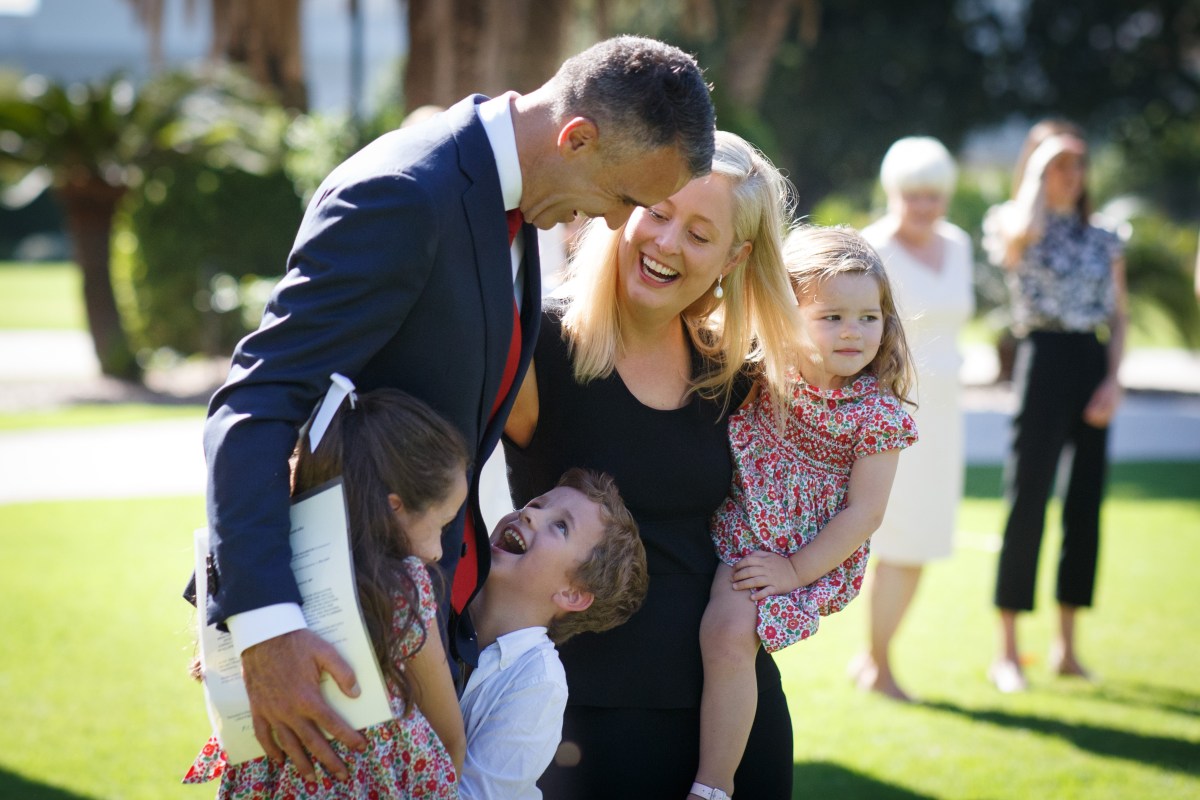
Premier Peter Malinauskas with his wife Annabel West and three children, Sophie, Jack and Eliza at Government House. Photo: Matt Turner/AAP
Malinauskas will spend the lead-up to Sunday’s state election anniversary away from his family.
He is in the United Kingdom, visiting the Barrow-in-Furness shipyard and meeting with defence officials in London in the wake of Tuesday’s AUKUS nuclear submarine announcement and its promise of long-term jobs and industry for South Australia.
It’s a momentous announcement for a government hitting its one-year mark, but when InDaily sat down to speak to the Premier at his Parliament House office last Thursday morning, details of what turned out to be a complex, three-nation deal costing up to $368 billion were not yet publicly known.
I say this in cabinet on a frequent basis: ‘Challenges shouldn’t be something that ministers develop a degree of anxiety about’
Instead, Malinauskas was keen to spruik his government’s introduction of legislation for a First Nations Voice to Parliament, the establishment of a Royal Commission into delivering preschool to three-year-olds and funding to support children with autism as among his proudest achievements in the job.
It’s policies like those, he said, which deliver what his government set out to create, as he put it on election night: “A fairer, better society and more opportunity.”
“I challenge anyone who observes politics, particularly South Australian politics, and ask them: ‘When was the last time that a government got elected in South Australia with the breadth of the policy that we got elected on?’,” he told InDaily.
“Hydrogen, health, education – everything from preschool to university amalgamation – big legislative reform around our democracy, whether it be the Voice, banning donations.
“It was a big agenda and I just want to focus on getting that delivered and then turn our minds to whatever’s next.”
‘Worry about what we can control’
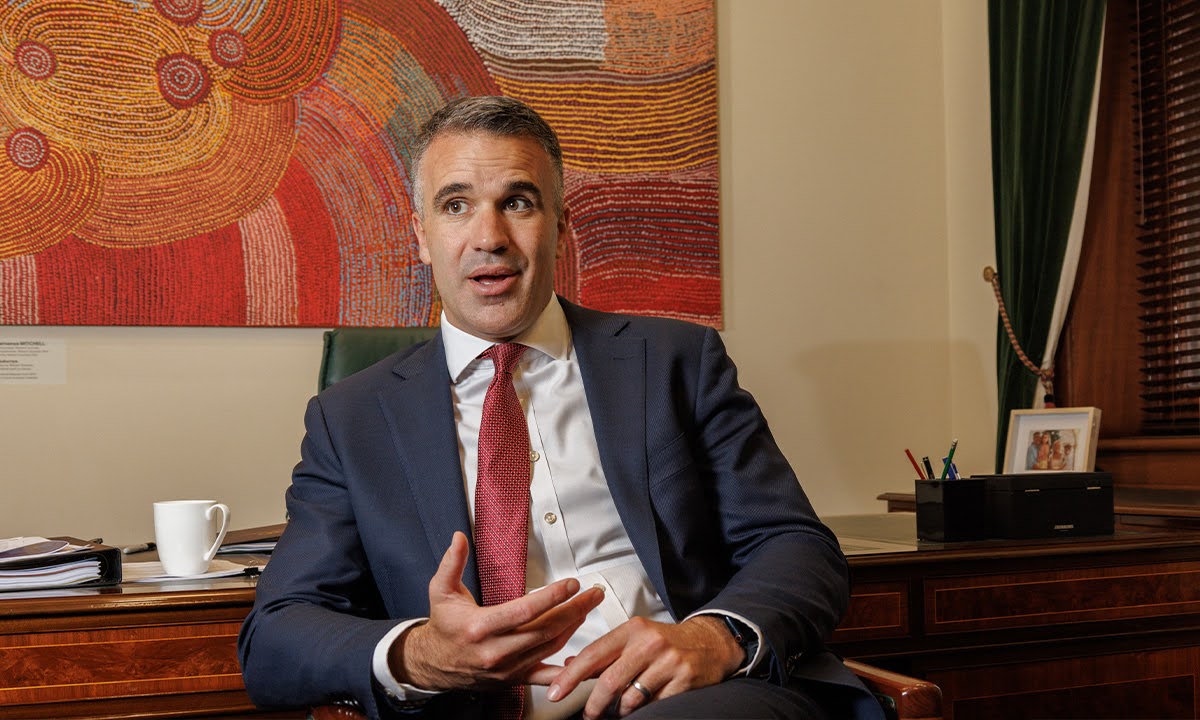
Photo: Tony Lewis/InDaily
Seeing off the one-term Marshall Liberal Government, sweeping into power off the back of the COVID-19 pandemic and a major campaign on a state public health crisis, the new Labor Government set a lofty – albeit ambiguous – ambition to lead the state’s “new reconstruction generation”.
“At this special moment in time, we get one shot to recover from a global pandemic as a state and as a nation,” Malinauskas said on election night.
“Let them say that we took this opportunity to deliver an economy that left no one behind.”
But in the past year, South Australia – like the rest of the nation – has experienced a cost-of-living crunch.
Interest rates have risen for the tenth consecutive time, the state’s gender pay gap has widened to 7.8 per cent and it’s been reported that more than half of South Australian children live in disadvantaged socio-economic circumstances.
News earlier this week that electricity bills could rise by more than 20 per cent for some South Australian households and businesses prompted warnings that those living in hardship would find it even harder to afford the essential service.
“The South Australian Government can’t control what’s happening to energy prices globally, we can’t in and of ourselves address rampant inflation across the nation’s economy, but what we can do is little things that make a difference,” Malinauskas told InDaily.
“Double the cost-of-living concession for a pensioner – that actually makes a difference – making a person with a senior’s card… catch public transport for free all the time.
“I say this in cabinet on a frequent basis: ‘Challenges shouldn’t be something that ministers develop a degree of anxiety about. They are an opportunity for us to address them’.
“If we worry about the things we can’t control in these jobs you’d just go crazy.
“We worry about what we can control, do what we can with the opportunity we’ve got and hopefully in turn, South Australians’ lives are better as a result.”
Ramping up targets
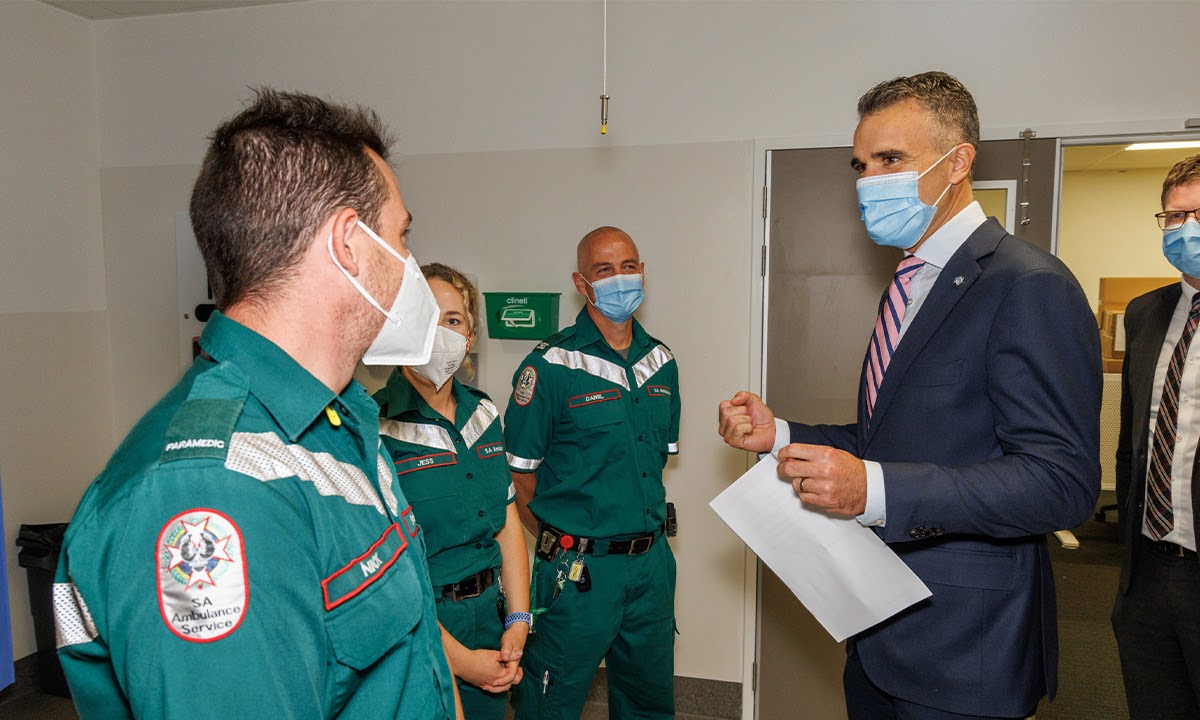
Photo: Tony Lewis/InDaily
Labor’s main election campaign strategy was a promise to “fix the ramping crisis”, the issue widely considered to have been a pivotal factor in the huge swing against the Liberals on election night.
As news of tragic patient deaths waiting for ambulances and hospital admittance hamstrung the final days of former premier Steven Marshall’s campaign amid a $400,000 Ambulance Employee Association campaign on ramping, Labor relentlessly pushed its claim that it was ready and willing to tackle the crisis.
The election results were a landslide, with Marshall conceding defeat just three hours after the polls closed.
Labor won 27 seats in the lower house, while the Liberals retained 16 seats – many of which, including Marshall’s eastern suburbs electorate of Dunstan, are now considered marginal.
Latest government data shows the number of hours ambulances spent stuck waiting outside Adelaide hospitals increased from 2138 in November 2021, to 3516 in November 2022.
We look towards the end of next year to hopefully start to see some material results
The number of hours ambulances spent ramped in January was down 16 per cent compared to December – the lowest number since last April.
“Ramping has been around forever and it’s going to be around for a while yet,” Malinauskas said.
“The question is how bad is it and what does it mean for ambulance response times? It got so bad that when people called triple zero the ambulance wasn’t rolling up on time, even for a life-threatening emergency.
“This is the commitment: We’ve got to get ambulance response times back down to 2018 levels.
“What does that actually mean? In 2018, P2 call-outs were 80 to 85 per cent on time, then it got down to 33 per cent.
“As of today, we’re back over 50 per cent, so there is improvement, but there is a long way to go.”
The Premier said that it was his government’s “hope and ambition” that improvements would continue up until the next state election in 2026.
“It will go up and down, but the trend to continue, so that by the time 2026 rolls around South Australians can pick up the phone when they’ve got a need, call triple zero and have confidence that the ambos are going to roll up on time,” he said.
“I appreciate there’s always going to be impatience for results – trust me, I feel it myself – but we look at our plan, we look at what we funded in the last year’s budget, we look at the time it takes to bring these things online and we look towards the end of next year to hopefully start to see some material results.”
Asked if Labor would set another target to address ambulance ramping at the 2026 state election, Malinauskas said: “probably”.
“Like I said, last year was really tough because you can’t click your fingers and open up that bed – although we have opened up quite a few beds,” he said.
“In the real world, people have to confront targets and specific metrics by which they’re measured on a daily basis.
“I don’t think governments should be immune from that and that brings a political risk, sure, but ultimately what South Australians want to see is leaders demonstrating a conviction and a determination to deliver outcomes. If I’m not willing to do that then why am I here?”
‘I don’t accept that characterisation’
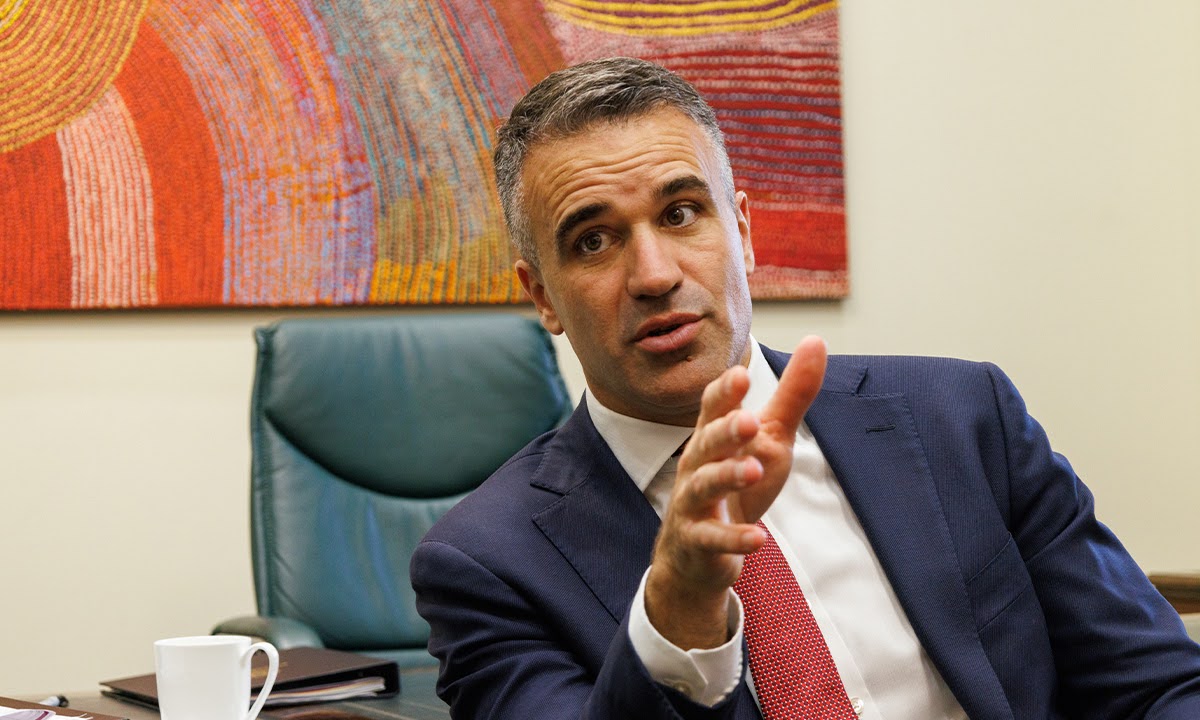
Photo: Tony Lewis/InDaily
Malinauskas doesn’t believe that Labor has broken an election promise by planning to demolish the state heritage-listed Thebarton Police Barracks to make way for the $3.2 billion new Women’s and Children’s Hospital, after vetoing a different city site chosen by the Liberal Government.
That’s despite video emerging of then-Opposition environment spokesperson – now minister and Deputy Premier Susan Close – telling a pre-election forum that “Labor has absolutely no intention of knocking over any state heritage place”.
“I don’t accept that characterisation,” Malinauskas said, when asked about the apparent broken promise.
“If you look back at the themes of the campaign, one of them that I was pretty embedded in prosecuting was, let’s make some long-term decisions, let’s make some decisions that set us up for the long-term, not the short-term.
“The easiest thing for us to have done as a government in terms of the Women’s and Kids’ was just to stick with the existing policy.
“(It’s) very hard for the Libs to criticise it given that they chose the location, so anything that would have gone wrong we could have just put on them.
“Presented with information that makes it plainly clear that the proposal for a new Women’s and Kids’ was going to mean that it was too small the day it opened and would forevermore mean that the RAH (Royal Adelaide Hospital) could never be expanded, it’s as short-term thinking as you can get.
“We made the decision we did, it’s controversial, but there is zero part of me that doesn’t believe that it is the right thing to do by the health system in the long run.”
As for the rest of his cabinet, Malinauskas hinted that there were “thoughts” about the decision to raze the barracks, although he steered clear of elaborating what those opinions were.
“I never talk about what happens in cabinet, but you would hope there are divergent views about a range of issues in cabinet, otherwise it’s not operating well and there are always different perspectives,” he said.
“I said: ‘Look, this is a test. This is a test for us – are we making a decision for now, or are we making a decision for the next election? Are we making a decision about a hospital that’s going to have to last 100 years?’ We chose the latter.”
SA’s ‘fraught’ area of public policy
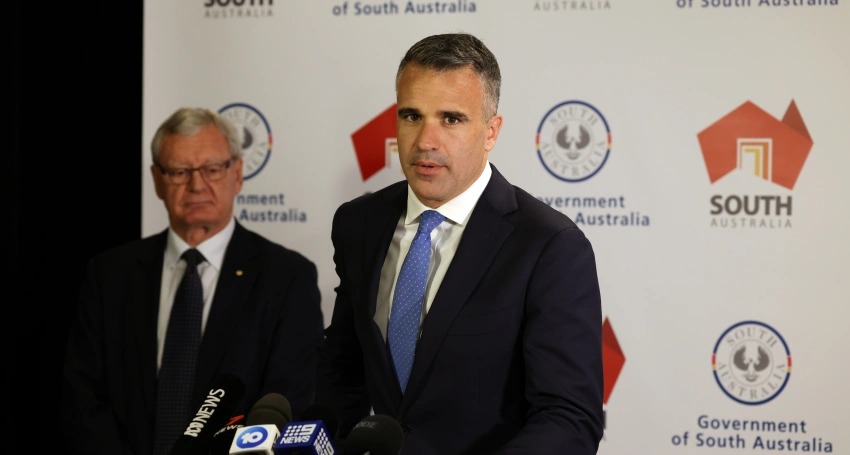
Former SA Police Commissioner Mal Hyde and Premier Peter Malinauskas. Photo: Tony Lewis/InDaily
The Premier is still frustrated that he can’t release the full report written by former SA Police Commissioner Mal Hyde following the deaths of six-year-old Munno Para girl Charlie and seven-year-old Craigmore boy Makai from alleged criminal neglect.
The children’s deaths – and ongoing police investigation – once again thrust the state’s child protection system into the headlines, with Malinauskas and his Child Protection Minister, Katrine Hildyard, faced with answering where, when and how the government failed to protect the children.
Hyde’s report was handed to the government in November but hasn’t been publicly released.
“One of the things that frustrated me in that process and still does to this day is not being able to fully release the entirety of the Hyde review by virtue of the fact it is still an ongoing matter in terms of police,” Malinauskas said.
“The government is never, ever going to be able to replicate the care and love that a parent or a guardian provides a child and we are deluding ourselves if we think otherwise.
“If you take a child away from their family they’ve got to have somewhere to go.
“We are massively short on foster carers, so they end up in residential state care and that’s not an ideal place to raise a child, let alone one who’s got complexities and difficulties.
“It’s a fraught area of public policy.”
Malinauskas admitted he hadn’t visited a residential care facility – a group home where just under 700 South Australian children are currently cared for by rostered carers – since becoming premier, but he did have “familiarity” with the facilities while he was the Police and Corrections Minister under the former Weatherill Government.
“Lots of these kids (in residential care) end up in those (correctional) facilities too, so you try and get your head around it then,” he said.
‘Heartbreaking’ incarceration of SA kids
For the first time, the Premier expressed his personal opinion about raising the age of criminal responsibility in South Australia from 10 to 14.
We’re talking about 10-year-olds – these are kids.
Legislation introduced by the Greens is currently before parliament to stop primary school-aged children from being locked up in detention, but the SA Police Association and Commissioner for Victims’ Rights have expressed concerns.
“I can’t think of anything more heartbreaking than, in effect, incarcerating a 10-year-old kid,” Malinauskas said.
“I struggle with the idea that 10-year-old kids can fully comprehend the consequences of their own actions.
“I’ve actively discussed this issue with the Police Commissioner a lot, including when I was the Police and Corrections Minister, so this is something I’ve had my eye on for a while.
“Raising the criminal age of responsibility is something I think is worthy of active consideration because we’re talking about 10-year-olds – these are kids.”
Attorney-General Kyam Maher told InDaily in August that a bipartisan agreement had been reached by all states – led by both Labor and Liberal governments – to develop proposals to raise the age of criminal responsibility.
At the time, he said work to increase the criminal age was continuing at a national level.
“What you have to ask yourself when you’re in these positions, though, is what are the consequences of actions if you do increase the criminal age of responsibility?” Malinauskas said.
“There is concern that if you do it the wrong way without a model to replace it, then you literally will have kids who commit crimes with complete impunity because they will know there is no consequence, and then there are more victims within our community and that’s not a good thing for anybody.
“I don’t think you can increase the criminal age of responsibility unless you’ve got a really well thought-through plan about what model is going to replace it.
“For most kids who have any intersection with the criminal justice system – mainly through police in the first instance – they learn from their mistakes and they move on.
“But there are a cohort of children who are in a particularly vulnerable situation and complex set of circumstances, who find themselves in a pattern of repeat offending.
“Breaking that cycle is hard.”
‘I’m not thinking about legacies’
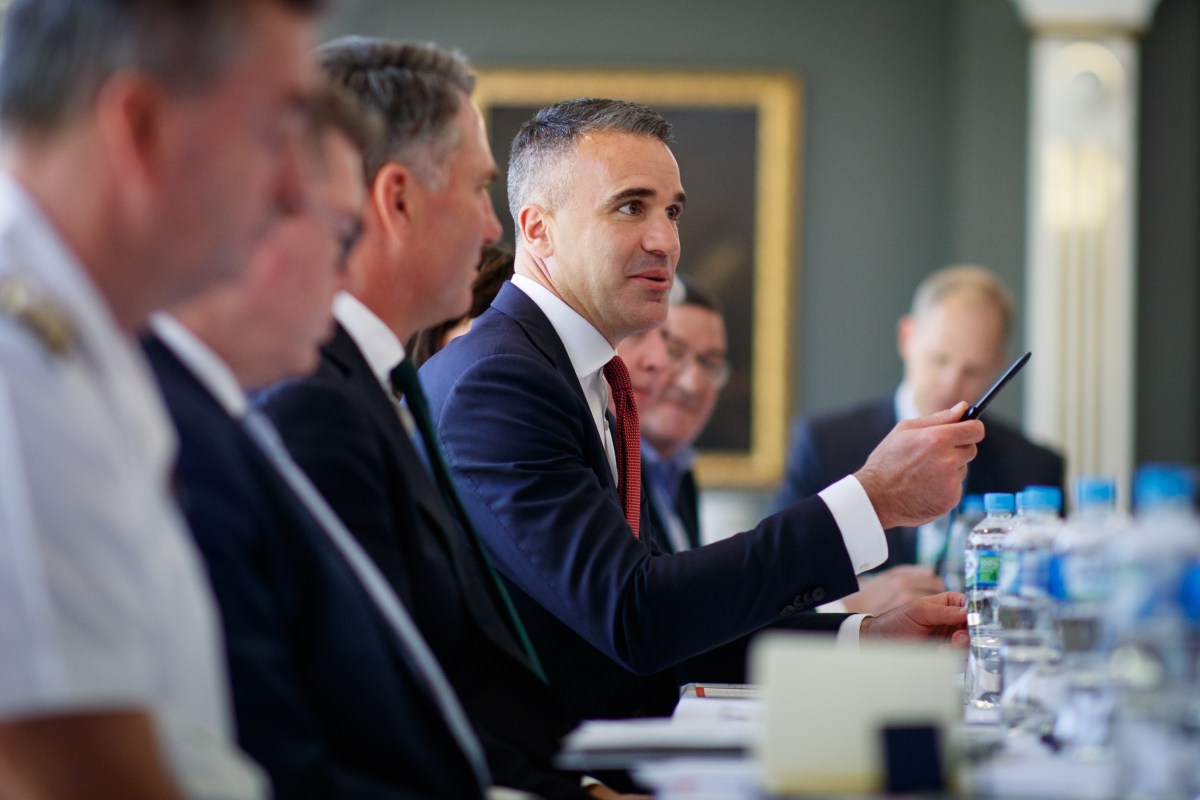
Photo: Matt Turner/AAP
“Predictions about what happens in politics is foolhardy,” Malinauskas believes.
“In this day and age, you never know what’s around the corner.”
Such was the case for the Marshall Government ahead of the 2022 election.
With its pandemic control advantage, the Marshall Government campaigned squarely on economic policy and the need for stability as the state transitioned out of COVID-19, but it reopened borders in November 2021 which led to an outbreak over Christmas.
Months later, after just one term in opposition following 16 years in power, Labor was back in office. Most political observers believe that Labor has at least two terms or another seven years in government at this stage.
The Premier says he’s not thinking that far ahead.
“These jobs – and I don’t say this publicly very often – are temporary by nature,” Malinauskas said.
“I’m not thinking about legacies.”
Instead, he says he is focussed on ticking off a series of “big challenges” over the course of his second year in office.
They include introducing laws to ban political donations, procurement for the government’s hydrogen jobs plan, progressing consultation on a university merger, implementing the recommendations of the Royal Commission into Early Childhood Education and setting up the South Australian First Nations Voice to Parliament.
“I hope that I’m lucky enough to be in this role for a while to get a fair bit done but you can’t take things for granted,” Malinauskas said.
“No one is the MP for a local area forever, no minister holds their portfolio forevermore and premiers come and go.”




